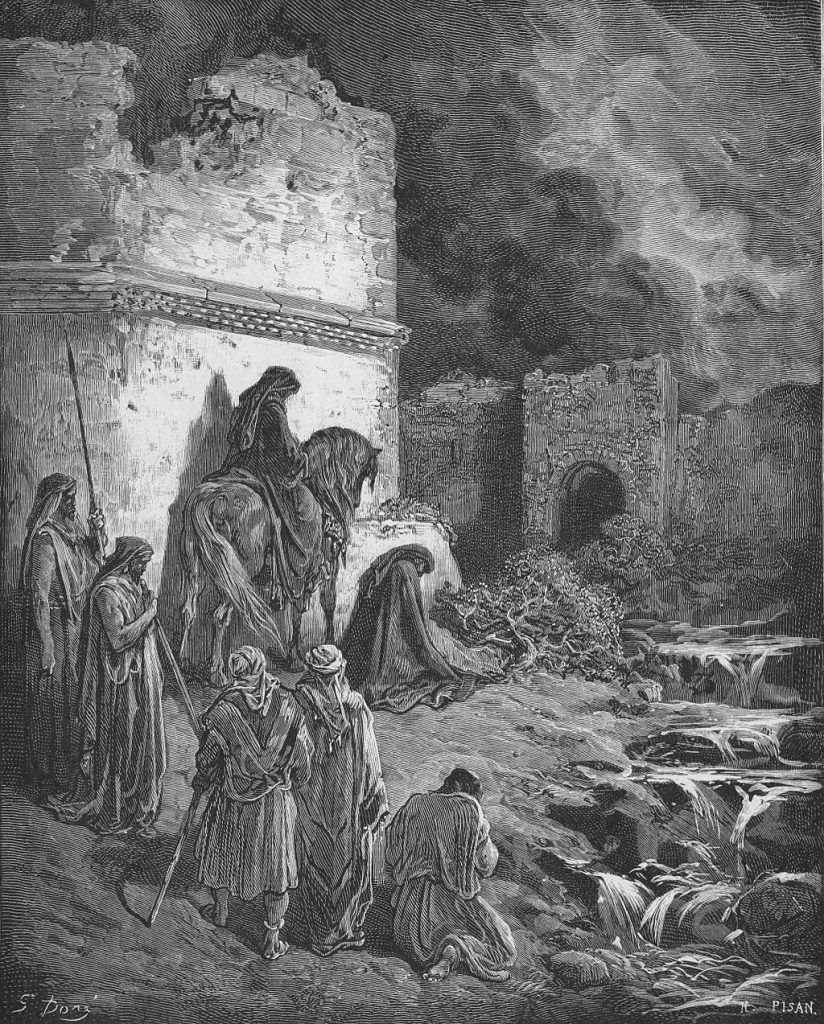
Copyright: Gustave Doré [Public domain]
The biggest gift, or curse, depending on your viewpoint, that Jews have bestowed upon the world is the concept of sin. Rules for human behavior are as old as civilization itself, and predate even the earliest forms of Judaism by at least three millennia, but breaking these rules involves a transgression against your neighbor, your superior, your sovereign. You may even anger a deity, for which, no doubt, he or she will exact the appropriate punishment. Piss in the river, and the river god may not bless you with fish, steal from your landlord and you may lose something precious, perhaps even your life. The Ganges River valley gave us the concept of purity and the cumulative nature of transgressions, which, when sufficiently heavy, may cause you to reincarnate as a toad or an untouchable in the next life. But if your bundle of transgressions is light enough, perhaps your lot will improve, if not in this life, then in the next.
In ancient Egypt, the gods formed a Stalin-style troika, with Anubis weighing your heart against a feather, Thoth documenting the findings, and Ammut standing by to carry out the sentence. But it fell to the ancient Hebrews to distill these concepts into the one overbearing concept of sin. And what was the greatest of all sins? Simple: it was failing to LOVE the One and Only God. It appears that the very word “love” (Hebrew: ahava), is a Hebrew innovation. Ancient Greek, lacking this concept (as distinct from lust or sexual desire), may have borrowed the word from Hebrew verbatim, creating the similarly pronounced “agape”. The gods of old, including the God of the Hebrews were hungry and they were certainly not vegan, at least not in the Middle East. In fact, their favorite dish was barbecue, particularly beef and lamb, though in tight spots fowl would do. Some, like Moloch, demanded human flesh once in a while. Be it as it may, they all loved the smell of meat roasting upon the altar. But even here there was an innovation when the Hebrews were concerned; before, sacrifices were made to ask the gods for something: fertility, good harvests, victory in war, the death of a pesky neighbor. After, sacrifices were made to ATONE FOR SINS. You see, all humans went about their lives with an invisible rucksack, the rucksack of sins. And as time wore on, the sin rucksack would get fuller and fuller, heavier and heavier and though the rate at which it was filling up would vary between the righteous and the wicked, the end result was the same: the rucksack would eventually become too heavy a burden to carry. But there was a solution: properly made sacrifice to the one God, performed by his chosen Cohen, would lighten the burden of sin, literally shrink the load in the sin rucksack. Just by how much that load would be lightened depended, of course, on the sacrifice: a honeycake was not the same as a perfectly flawless ram or a young bull, but the principle was the same.
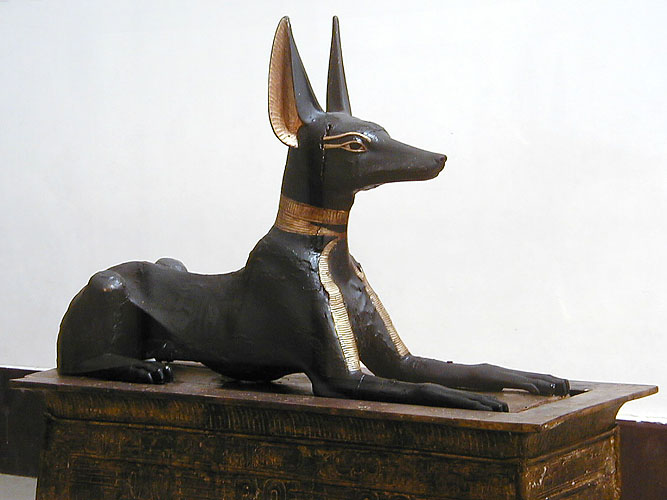
Copyright: Jon Bodsworth [Copyrighted free use], via Wikimedia Commons
It is easy for us to laugh at this unequal sin unburdening, but I discern a higher purpose in this. There is something divinely purifying in the act of sacrificing the most that one can sacrifice, be it a sweet that one can’t afford for one’s own children or the perfect ram that was hand-raised from lambhood. By forbidding human sacrifice, early Judaism replaced the ultimate sacrifice, the sacrifice of one’s own flesh and blood by something much more affordable and above all humane, a material possession. Like all organized religions, early Temple Judaism was used as a means of power and control. Since the city of Jerusalem happened to be the capital city of the Tribe of Judah, it made perfect sense for the leaders of this tribe, the House of David, to declare the newly built First Temple as the only place that God would be open to trading sin relief for animal sacrifice. This was big business; pilgrims needed a place to stay and food to eat, the priests collected a tenth of each sacrifice and since God was only interested in the smell, they happily ate the meat from His altar. Since travel to Jerusalem from the Galilee or the Golan Heights on foot or by donkey was not really possible for most people, it is no wonder that the ten northern tribes refused to recognize Judah’s Jerusalem temple supremacy, leading to a split in the newly formed Kingdom of Israel. Even within Judah, as the Book of Kings constantly reminds us, people continued offering sacrifices “on every high place and under every leafy tree”.
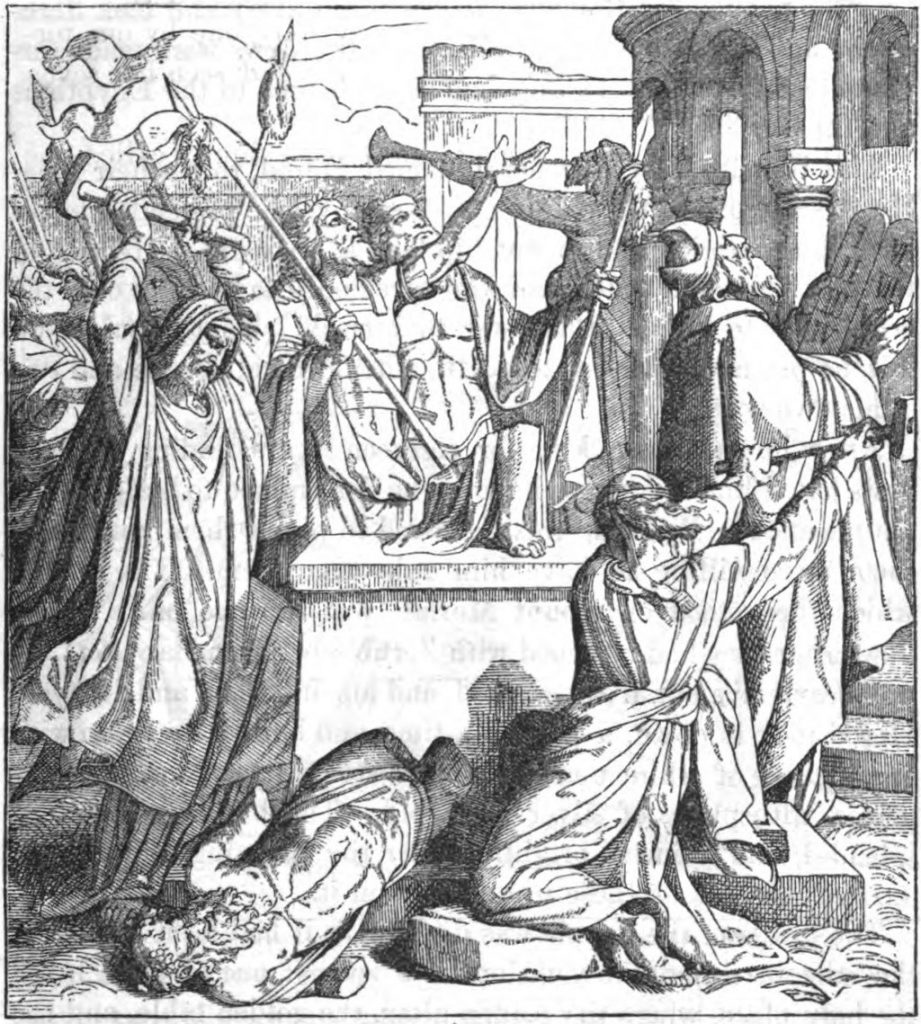
Copyright: Unknown author [Public domain], via Wikimedia Commons
It was only after the loss of the ten tribes and the exile of the Judean elites to Babylon that upon their return to Judea the supremacy of the Temple took hold. These returning elites rejected the pleas of the peasants who remained behind to rejoin the Nation of Israel, calling them unclean for continuing sacrifice service on Mount Gerizim in Samaria even as the Jerusalem Temple lay in ruins. These rejects are the Samaritans, of Good Samaritan fame, and a few hundred of them still sacrifice to Him on the same ancient mountaintop, now in the Palestinian-controlled territories. From the crucible of exile and return a truly monotheistic Judaism centered upon the Second Temple in the rebuilt Jerusalem was born and it lasted for nearly five centuries until the destruction of the Second Temple by the Romans in 70 AD. It was that cataclysmic event that gave us the two non-identical twins of Rabbinical Judaism and Christianity.
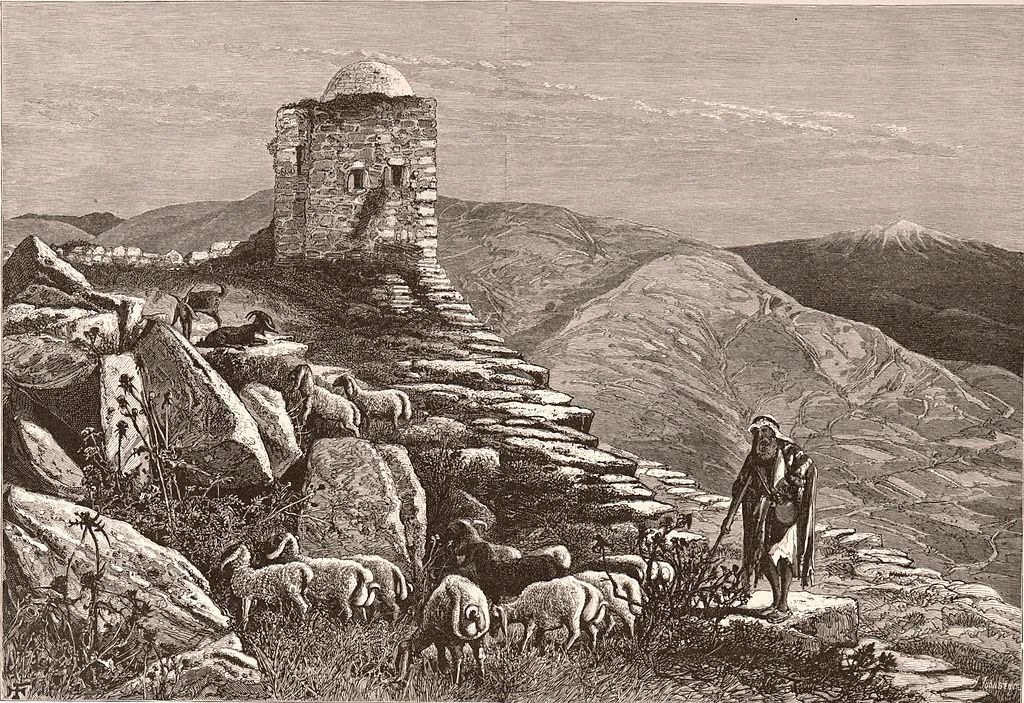
Ruins on the summit of Mount Gerizim, on the site of the Samaritan temple. In the distance, on the right, the snow-covered peaks of Mount Hermon are visible.
Copyright: Harry Fenn [Public domain]
You see, after the destruction of the Temple, the sin rucksack was not filling at a slower rate than before, but the mechanism of emptying it out was gone; the Holy of Holies lay in ruins, the great altar was smashed to smithereens, the gold vessels used in sacrifice service were being melted down in Rome to pay for the Coliseum. This was a true crisis. Something had to be done. And it was. Not one thing, but two and as usual, the split was along class lines. The priestly elites, the great rabbis, pioneered the concept of virtual reality; they packaged, really repackaged, Judaism into something that had never before existed: a fully fledged religion that did not center on a temple or a geographic region, but on a Book (in fact a series of books, and commentaries on books, and legal treatises, and transcribed oral lore). In a very real sense, they created the world’s first IP (intellectual property) vault that they called simply the Torah (literally, the Teaching). And here’s the real kicker: every Jew could continuously empty out their sin rucksack just as quickly as they were filling it in by studying the Torah and doing their best to adhere to its commandments. But how to make sure that I adhere to the commandments, you may ask. Some of them, after all, are rather obscure and open to interpretation. Ah, say the Rabbis: back to the first one! Study the Torah, in its entirety, the original texts, and the commentaries, and the oral traditions, and we will make sure that the way, the Halacha, is clear to you. Yes, you will still sin, you will still transgress, but if you study the Torah and follow the way we had set out for you, even as it is constantly evolving, you will significantly lighten your load, and then, on the Day of Atonement, you can beg for His divine pardon for whatever is left.
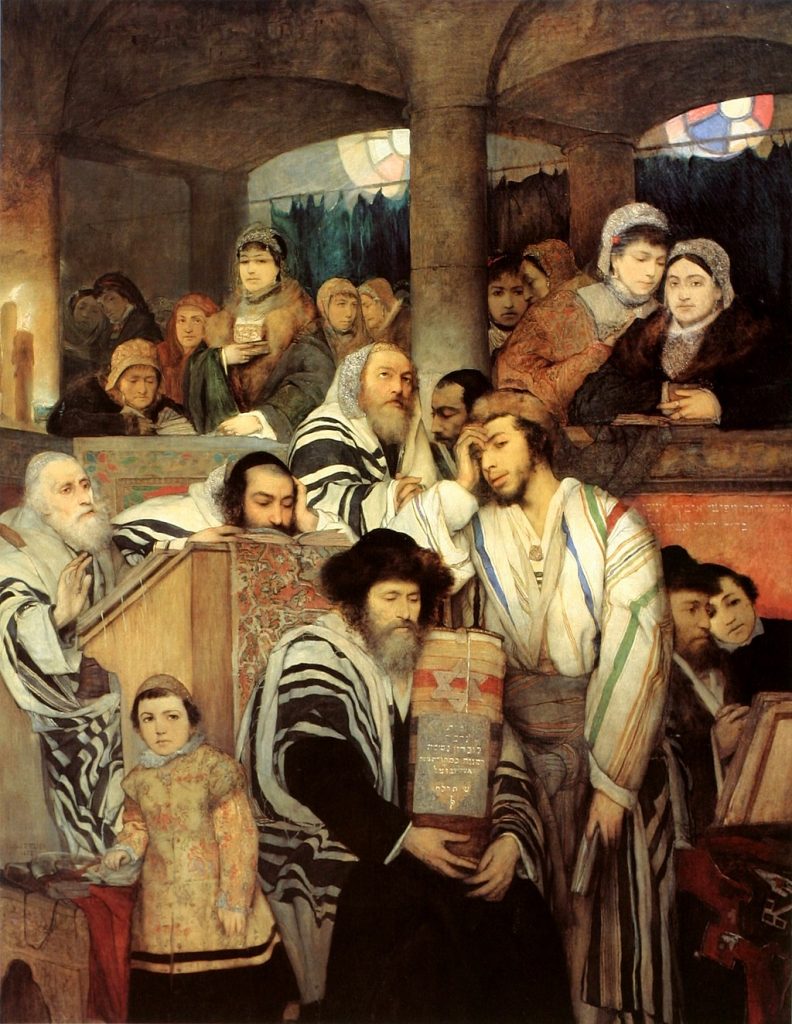
Copyright: Maurycy Gottlieb [Public domain]
Of course, studying the Torah is all good and well, but only if you are literate. Yes, you can go to this newly established “Synagogue” that the rabbis just had built in your town, and yes, there is your local teacher (rabbi) explaining to you in your native Aramaic the ancient Hebrew texts, but is it really enough? If you can’t read for yourself, how can you make sure? First century AD Judea was an agrarian society. Young boys had to help their fathers in the fields or in the shop; they had no time to learn high-level literacy in their ancestral Hebrew language that was long since displaced by the popular Aramaic. The truth was that only the Jewish elites could benefit from the sin disposal solution invented by the Sages. But what about the rest? Well, as it happened there was a solution. A few decades earlier, a Galilean Jew by the name of Yeshua Bar Yosef was running around the countryside with a bunch of followers claiming to be the Son of God and offering complete sin removal for all time for those who took him at this word. Of course, he was crucified for such blasphemy, but now his followers and their followers were beginning to claim that in doing so he offered God the ultimate sacrifice for all mankind, that no more sacrifices were needed. That illiterate Jews, even Gentiles, could gain the ultimate forgiveness for their sins if they accepted Yeshua as the Messiah and believed in his ultimate self-sacrifice for the sake of all humanity.
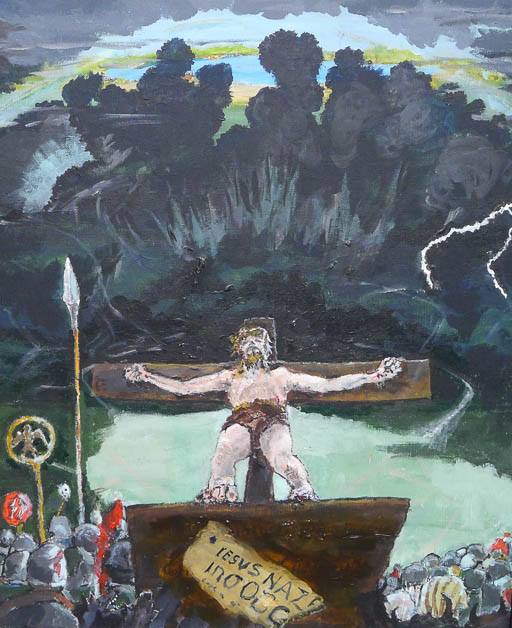
Copyright: Poldermick [CC BY-SA 4.0 (https://creativecommons.org/licenses/by-sa/4.0)], from Wikimedia Commons
It required a good amount of elitism, aloofness, and stubbornness to reject this Christian (literally from the Greek, messianic) message. But the Jewish elites had those qualities in spades. The destruction of the Second Temple, just like the First, was a purifying event for Judaism and for the Jews themselves. Once again, the elites were separated from the rest of the nation. Once again, many of them took their newly portable religion and left their ancestral homeland not to return for nearly two millennia. Most stayed. They became Christian when it was the thing to do as Rome adopted Christianity as its state religion. The conquest of Judea by the Romans and their assumption of direct rule over it in the aftermath of the Great Jewish Revolt dispersed not only those Jews who rejected Jesus as the Messiah, but also those that accepted him as such. As Saul (Paul), one of the greatest marketing geniuses of all time understood, the big market was not the Jews, it was the Gentiles. And they sure were ready to buy a discount ticket (no commandments, no studying of obscure texts, no circumcision) to eternal salvation. The rest, as they say, is history.


